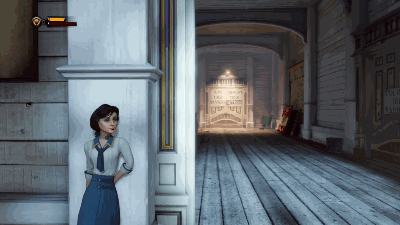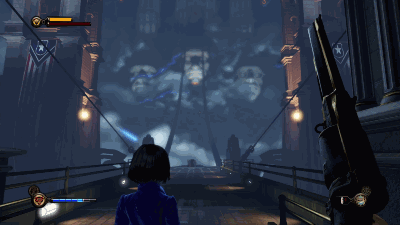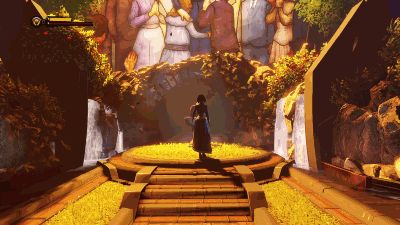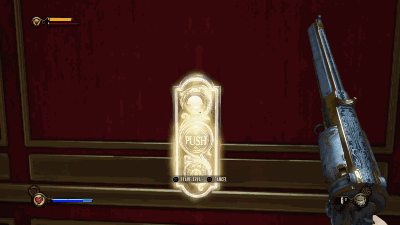
It took no time at all during my recent replay of BioShock Infinite on PS4 to realize how far and how fast not only the video game industry has traveled in four years, but all of entertainment.
Storytelling can be splashed on countless new mediums. New audiences have opened up. The so-called "walking simulator" genre—think Gone Home or Life Is Strange—present painfully honest, human storytelling to breed a potential Netflix alternative.
And AAA-video game like BioShock Infinite signal that not all interactive world-making will lean so hard on murder as their interface method...
Why are walking simulators popular these days?

When BioShock Infinite was originally conceived somewhere between 2008-2010, Ken Levine and his team at Irrational Games likely looked at where they'd come from, looked at the game-making landscape, and said, "Yeah, it's gonna be first-person, and it's gonna have headshots." From there, the world's fiction was painted on top of the gigantic hay-barn that was the contemporary FPS genre.
Adventure games were dead and walking simulators were still taking their baby steps over on the PC.
Of course, a "walking simulator" is a sarcastic genre definition from video game commentators lacking imagination. For the sake of SEO, and to keep with common parlance, I'll indulge the definition so everyone can follow along without layering in the requisite vocabulary-math, should I not borrow the terminology.
Why are they so popular? Seems like new entries show up no PSN and Steam every week. Why? Why do I mention them in the same breath as BioShock Infinite, a first-person shooter, and as well as Netflix, a video streaming service?
Because upon revisiting BioShock Infinite, I can theorize this game truly wishes it didn't have to include quite so many guns, quite so many headshots, and quite so many magic powers. I enjoys its violence, profanity, and racism, as most walking simulators do, but if BioShock Infinite could engage its own story in sexual congress, it wouldn't invite the shooting in for a threesome.
BioShock Infinite devotes football fields of square footage to its lovely worldcraft. It has ideas about American dynamism, sense of self, and destiny. Its floating cult-city of Columbia is a digital, racist theme-park. Its gun-sessions are limp, piddly affairs.

Walking simulators are popular because players like video games with ideas. People like entertainment with things to say and characters real enough to say them. Few games have the time and money to invest in such an intangible factor. I'll cite Telltale's The Walking Dead series and The Last Guardian as games who prefer their world-missions to their jump buttons. Yes, The Last Guardian is a walking simulator where you follow a strange beast. Trico is the subject, you do the walking, get over it.
Walking simulators can be smaller coding affairs, propelled by creativity and human story. They require little to no enemy AI, no destructive environments, and few game "systems" beyond carrying objects, should the designer require an inventory. They are narrative vessels, above all. They happen to be available via game distribution networks.
How does Netflix factor in?

I was wowed by how often BioShock Infinite holsters its weapon and asks you—no, permits you—to hang out with its story and setting. It is its own TV series, video game, and Wikipedia entry, if you bother to go searching for its extra details when given the chance.
Elaboration: compare the roughly 10 hours required to play a season of Telltale's Game of Thrones to the 10 hours required to watch a season of HBO's Game of Thrones. The former permits you to explore and engage, often calmly and casually, a violent medieval landscape, as told by digital actors. The latter permits you to observe a violent medieval landscape, as told by flesh and blood actors.
Someday, the writing and production for the game will equal that of the show. The game will permit greater depth and involvement. The game will be our Netflix alternative. In our current environment, audiences must study additional resources online between episodes of Game of Thrones for greater detail and motivation. In the potential video game future, the audience will have the opportunity to explore the digital space in pursuit of the same payoff.
Someday, a game as thoroughly unique and gigantic as BioShock Infinite will not remain beholden to piddly gunfights between 3D storyscapes. Its imagination and literary aspirations are already there, despite occasionally being misguided and hot-glued together to reach a video game release date.
If Netflix is the future of television, then walking simulators will be the Netflix alternative. It won't replace Netflix, because TV didn't kill the cinema, and Spotify didn't kill the radio—the Citizen Kane of video games will be an interactive post-post-HBO series.
What's next for AAA video games?

Creator command will rise in games. The production funnel will quicken and prices will lower. Video game auteurship will become more viable. With the current demand for coders in the world, eight people and $4 million will be able to develop interactive creative content as potent and passionate as Ken Levine's BioShock Infinite, and the market will not demand it be a first person shooter, too. It'll borrow technology from movie making. Entirely digital walking simulators telling stories of all kinds will rival Master of None.
Audiences will subscribe to creators' streams and follow their work. It'll be worth the investment for studios to fund big, beautiful projects.
That will be half of video games: digital novels and works of original fiction. That will be your Netflix alternative.
The other half will be e-sports. MOBAs, shooters, fighters, and any digital, competitive playing fields developers can conceive. These will be digital sporting goods: simple enough for a player to engage casually, righteous enough for professionals to parse and global fans to enjoy. That will be your sporting alternative.
They will vary in tiers of complexity, quality, and creativity. Personality behind both the story and e-sport variants will either fail or succeed to attract an audience. Buying in will be inexpensive, or even free, just like tuning in for a football game or checking a book out of a library.
All of this begins with heroic failures like BioShock Infinite willing to take wobbly, uncertain steps into unpredictable territory. We should be willing to take that ride, too.

What've we to lose?

